10 Tips for a Healthy Immune System (part three)
While the majority of articles about supporting a healthy immune function tend to focus on nutrients and botanicals that directly affect the immune system, what is often overlooked is the significant impact that immune stressors have on immunity. Immune stressors are lifestyles or foods that interfere or suppress a healthy and balanced immune response.  In part II we went into depth on the impact and importance of sleep quality and quantity along with tips to help improve both. In part III we will explore another impactful stressor, namely stress. But don’t fret, in part IV we will look at a number of key nutrients that are necessary for immune function along with herbal and mushroom allies to support and optimize our immune system.
In part II we went into depth on the impact and importance of sleep quality and quantity along with tips to help improve both. In part III we will explore another impactful stressor, namely stress. But don’t fret, in part IV we will look at a number of key nutrients that are necessary for immune function along with herbal and mushroom allies to support and optimize our immune system.
Everybody’s “Friend”, Stress
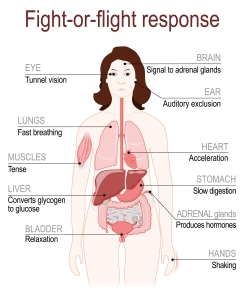 While stress generally has a bad reputation, it’s important to note that not all stress is bad, in fact, it can be said that there are two general types of stress, “good” stress and “bad’ stress. These two types of stress correlate for the most part with short-term, also called acute stress, or long-term, or chronic stress.
While stress generally has a bad reputation, it’s important to note that not all stress is bad, in fact, it can be said that there are two general types of stress, “good” stress and “bad’ stress. These two types of stress correlate for the most part with short-term, also called acute stress, or long-term, or chronic stress. 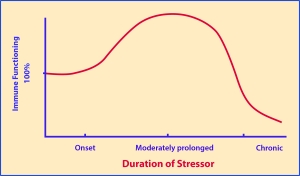 The physiological responses and effects are quite different. An example of acute stress would be something like going to the dentist (no offense to dentistry), or getting pulled over, or say having to write a blog post before a fast-approaching deadline. Chronic stress would be long-term worries over finances or career or dealing with a prolonged illness. The past few years as the world has dealt with the covid crisis with all its consequences is a timely example of chronic stress.
The physiological responses and effects are quite different. An example of acute stress would be something like going to the dentist (no offense to dentistry), or getting pulled over, or say having to write a blog post before a fast-approaching deadline. Chronic stress would be long-term worries over finances or career or dealing with a prolonged illness. The past few years as the world has dealt with the covid crisis with all its consequences is a timely example of chronic stress.
This may surprise you, but short-term stress actually is beneficial. It’s the body’s natural physiological response to an immediate crisis. And its effects on the immune system tend to be positive. It all comes down to how the body was built for the “fight or flight” stress model.
Our bodies are designed to have to either run from a physical threat, maybe a tiger, or to stand and fight that threat. The problem that arises is that the stress we deal with much more so nowadays is impacting us over the long-term so what is healthy for the situation of dealing with the tiger is not necessarily helpful when dealing with ongoing job stress for example. In short-term stress our body puts its energy into dealing with the tiger in a number of ways. One way is to shunt blood away from digestion and into our muscles for the battle or the runaway. This is just one of many helpful physiological responses to our tiger illustration. Clearly these changes are not helpful for us with our day-to-day stresses such as in the job example. Working five days a week with an under-functioning digestive tract clearly doesn’t help the situation and it’s easy to see how it could contribute to one’s ill health. A clear difference in how our body responds to these two types of stress can be seen in how our immune system reacts to each. Short-term stress has an anti-inflammatory effect with the stress hormone cortisol restricting inflammation. Chronic stress on the other hand causes an adaptation that leads to creating an ongoing inflammatory response. For the rest of this discussion we will be referring to the issues of chronic stress.
Impact of Stress
Western medicine was a little slow when it comes to acknowledging and studying stress’s impact our overall health and immune system function. Thankfully in the last decade or so a significant amount of research has been done exploring the influence stress has on our immune system. Much of stress’ sway over our immune system revolves around it increasing stress hormones, namely cortisol and corticosteroids. Research has shown that persistently high levels of these hormones lead to the body developing a resistance to them thereby impairing the body’s anti-inflammatory response. This can result in chronic infections, chronic auto-immune disorders, and even cancers. Here is a partial list of what research has to say about the physiology of chronic stress:
- Interferes with white blood cell communications
- Lowering the number of white blood cells
- Lower lymphocytes decrease the body’s defensive capabilities and raise the risk of infections
- Impacting brain wiring that oversee various immune functions
- Decreases white blood cell proliferation as well as natural killer cell activity
- Reduces the quantity of antibodies (compounds our immune system produces that bind to pathogens marking them for destruction by our white blood cells)
- Stress can stop or slow the movement of immune cells
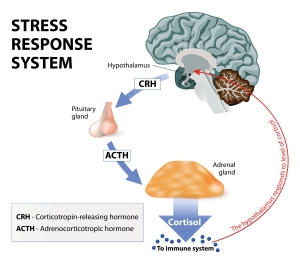 There are a couple of studies that clearly demonstrate the immune impact that stress has. The first study found that mice infected with influenza virus saw inflammatory imbalances and reduced antibody levels. A second study performed with medical students found that those reporting the most stress had the weaker immune responses. Immune cell distribution and production was significantly altered along with the secretion of specific cytokines.
There are a couple of studies that clearly demonstrate the immune impact that stress has. The first study found that mice infected with influenza virus saw inflammatory imbalances and reduced antibody levels. A second study performed with medical students found that those reporting the most stress had the weaker immune responses. Immune cell distribution and production was significantly altered along with the secretion of specific cytokines.
 How seriously impactful can stress’ effects be? While stress may not cause malignancies studies have demonstrated that stress can accelerate the development and growth of malignancies. Hopefully this has made the case for how important it is to manage our stress levels in order to maintain a healthy immune system. We should also mention here that stress brings with it a whole range of auxiliary impacts, ones we are all likely familiar with to some degree. These can affect not only immune health but overall health and vitality as well. Stress invites a range of unhealthy coping behaviors, like poor food choices, smoking, drug use, poor sleep, and alcohol abuse.
How seriously impactful can stress’ effects be? While stress may not cause malignancies studies have demonstrated that stress can accelerate the development and growth of malignancies. Hopefully this has made the case for how important it is to manage our stress levels in order to maintain a healthy immune system. We should also mention here that stress brings with it a whole range of auxiliary impacts, ones we are all likely familiar with to some degree. These can affect not only immune health but overall health and vitality as well. Stress invites a range of unhealthy coping behaviors, like poor food choices, smoking, drug use, poor sleep, and alcohol abuse.
Holistic Choice
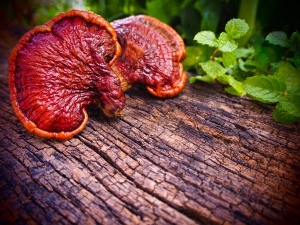 There are a number or natural remedies that can support a healthier stress response directly. However, since stress impacts the body so broadly, and can impede our immune system from doing an effective job, why not choose a remedy that will aid your body to better handle stress, support a healthy immune response all the while also supporting overall health. One all-star that fits this bill is the Reishi mushroom. This long used traditional remedy was so highly valued that it was called the mushroom of immortality. I have coined the phrase “tonic for the 21st century” to summarize how wonderful and specific an ally Reishi is for many of the health needs of today. Reishi was considered a Shen tonic in traditional Chinese medicine.* You can think of Shen as the same thing we refer to when we say someone has a broken heart. When we say this we don’t mean the four chambered organ in our chest, rather we mean the emotional center of our body. Reishi is all about balance, and considering that one of stress’s immune disturbances is imbalancing our immune responses, it seems like a perfect fit. Reishi supports a healthy immune and inflammatory responses, fights free radicals, and supports healthy cardiovascular, liver, kidney, and respiratory functions. Reishi does all this while also supporting a healthy, balanced stress and immune response.*
There are a number or natural remedies that can support a healthier stress response directly. However, since stress impacts the body so broadly, and can impede our immune system from doing an effective job, why not choose a remedy that will aid your body to better handle stress, support a healthy immune response all the while also supporting overall health. One all-star that fits this bill is the Reishi mushroom. This long used traditional remedy was so highly valued that it was called the mushroom of immortality. I have coined the phrase “tonic for the 21st century” to summarize how wonderful and specific an ally Reishi is for many of the health needs of today. Reishi was considered a Shen tonic in traditional Chinese medicine.* You can think of Shen as the same thing we refer to when we say someone has a broken heart. When we say this we don’t mean the four chambered organ in our chest, rather we mean the emotional center of our body. Reishi is all about balance, and considering that one of stress’s immune disturbances is imbalancing our immune responses, it seems like a perfect fit. Reishi supports a healthy immune and inflammatory responses, fights free radicals, and supports healthy cardiovascular, liver, kidney, and respiratory functions. Reishi does all this while also supporting a healthy, balanced stress and immune response.*
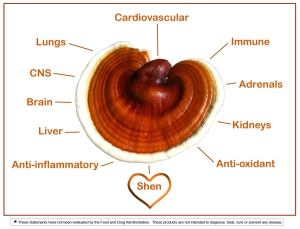 There’s one more stress defender I want to mention. It can be considered the ultimate stress defender. And that defender is you. The most powerful ally in the battle against stress is our response to the stress, how we choose to respond. Take for example driving in traffic, one day you are running late, as a result you are impatient, and your blood pressure and stress levels jump through the roof. Take the same traffic conditions but this day you are in a really good mood, looking forward to the day, enjoying the music on the radio and, guess what, your blood pressure and stress levels stay low. Same conditions but a different behavior chosen. Hans Selye, the first to coin the word “stress” to refer to this physiologic tension, wrote: “There’s no such thing as stressful situation, only stressful responses.” Stress needn’t control us. Stress needn’t negatively impact our immune health. Thankfully we have the power of choice… and the wonderful and powerful natural tonic ally, Super Reishi.*
There’s one more stress defender I want to mention. It can be considered the ultimate stress defender. And that defender is you. The most powerful ally in the battle against stress is our response to the stress, how we choose to respond. Take for example driving in traffic, one day you are running late, as a result you are impatient, and your blood pressure and stress levels jump through the roof. Take the same traffic conditions but this day you are in a really good mood, looking forward to the day, enjoying the music on the radio and, guess what, your blood pressure and stress levels stay low. Same conditions but a different behavior chosen. Hans Selye, the first to coin the word “stress” to refer to this physiologic tension, wrote: “There’s no such thing as stressful situation, only stressful responses.” Stress needn’t control us. Stress needn’t negatively impact our immune health. Thankfully we have the power of choice… and the wonderful and powerful natural tonic ally, Super Reishi.*
